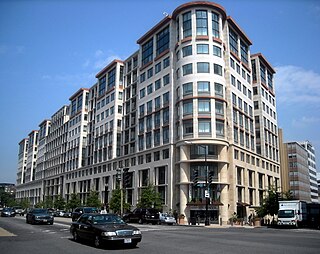
The International Finance Corporation (IFC) is an international financial institution that offers investment, advisory, and asset-management services to encourage private-sector development in less developed countries. The IFC is a member of the World Bank Group and is headquartered in Washington, D.C. in the United States.

Infrastructure is the set of facilities and systems that serve a country, city, or other area, and encompasses the services and facilities necessary for its economy, households and firms to function. Infrastructure is composed of public and private physical structures such as roads, railways, bridges, tunnels, water supply, sewers, electrical grids, and telecommunications. In general, infrastructure has been defined as "the physical components of interrelated systems providing commodities and services essential to enable, sustain, or enhance societal living conditions" and maintain the surrounding environment.
The private finance initiative (PFI) was a United Kingdom government procurement policy aimed at creating "public–private partnerships" (PPPs) where private firms are contracted to complete and manage public projects. Initially launched in 1992 by Prime Minister John Major, and expanded considerably by the Blair government, PFI is part of the wider programme of privatisation and financialisation, and presented as a means for increasing accountability and efficiency for public spending.

NatWest Group PLC is a British banking and insurance holding company, based in Edinburgh, Scotland.

Sir John Vincent Cable is a British politician who was Leader of the Liberal Democrats from 2017 to 2019. He was Member of Parliament (MP) for Twickenham from 1997 to 2015 and from 2017 to 2019. He also served in the Cabinet as Secretary of State for Business, Innovation and Skills from 2010 to 2015.
An institutional investor is an entity that pools money to purchase securities, real property, and other investment assets or originate loans. Institutional investors include commercial banks, central banks, credit unions, government-linked companies, insurers, pension funds, sovereign wealth funds, charities, hedge funds, real estate investment trusts, investment advisors, endowments, and mutual funds. Operating companies which invest excess capital in these types of assets may also be included in the term. Activist institutional investors may also influence corporate governance by exercising voting rights in their investments. In 2019, the world's top 500 asset managers collectively managed $104.4 trillion in Assets under Management (AuM).
National Grid plc is a British multinational electricity and gas utility company headquartered in London, England. Its principal activities are in the United Kingdom, where it owns and operates electricity and natural gas transmission networks, and in the Northeastern United States, where as well as operating transmission networks, the company produces and supplies electricity and gas, providing both to customers in New York and Massachusetts.
Babcock & Brown LP was a global investment and advisory firm, established in 1977, based in Sydney, Australia, that went into liquidation in 2009.

The Airport Link is a tunnelled, motorway grade, toll road in the northern suburbs of Brisbane, Queensland, Australia. It connects the Brisbane central business district and the Clem Jones Tunnel to the East–West Arterial Road which leads to the Brisbane Airport. It was built in conjunction with the Windsor to Kedron section of the Northern Busway in approximately the same corridor.
In finance, the private-equity secondary market refers to the buying and selling of pre-existing investor commitments to private-equity and other alternative investment funds. Given the absence of established trading markets for these interests, the transfer of interests in private-equity funds as well as hedge funds can be more complex and labor-intensive.

The Royal Bank of Scotland is a major retail and commercial bank in Scotland. It is one of the retail banking subsidiaries of NatWest Group, together with NatWest and Ulster Bank. The Royal Bank of Scotland has around 700 branches, mainly in Scotland, though there are branches in many larger towns and cities throughout England and Wales. The bank is completely separate from the fellow Edinburgh-based bank, the Bank of Scotland, which pre-dates the Royal Bank by 32 years. The Royal Bank of Scotland was established to provide a bank with strong Hanoverian and Whig ties.

Macquarie Group Limited is an Australian global financial services group. Headquartered and listed in Australia, Macquarie employs more than 20,000 staff in 34 markets, is the world's largest infrastructure asset manager and Australia's top ranked mergers and acquisitions adviser, with more than A$871 billion in assets under management.

Lloyds Banking Group plc is a British financial institution formed through the acquisition of HBOS by Lloyds TSB in 2009. It is one of the UK's largest financial services organisations, with 30 million customers and 65,000 employees. Lloyds Bank was founded in 1765 but the wider Group's heritage extends over 320 years, dating back to the founding of the Bank of Scotland by the Parliament of Scotland in 1695.

First Sentier Investors, formerly known as Colonial First State Global Asset Management in Australia and First State Investments elsewhere, is a global asset management business that manages US$146.2 billion in assets managed on behalf of institutional investors, pension funds, wholesale distributors, investment platforms, financial advisers and clients worldwide. First Sentier Investors provides active, specialist investment capabilities managed by a group of independent investment teams. They take a long-term approach to investment with a focus on preserving capital and performance through market cycles.

Climate finance is an umbrella term for financial resources such as loans, grants, or domestic budget allocations for climate change mitigation, adaptation and/or resiliency. Finance can come from private and public sources and can be channeled by various intermediaries such as multilateral development banks or other development agencies. Development agencies are particularly important in the transfer of public resources from developed to developing countries in light of their UN Climate Convention obligations.

Gulf International Bank (GIB) was established in 1976 during the first oil boom and is incorporated in the Kingdom of Bahrain as a conventional wholesale bank. It is licensed by the Central Bank of Bahrain and is headquartered in Manama in Bahrain.
Capital for Enterprise Limited (CfEL) was a limited company in the United Kingdom owned by the Department for Business, Innovation and Skills (BIS). CfEL was responsible for managing BIS's financial schemes, such as venture capital funds and loan guarantees, aimed at helping small and medium enterprises (SMEs). It invested over £1.8 billion from its formation and alongside private capital provided £6.5 billion in credit for SMEs. It ceased operating independently on 1 October 2013 and became part of the British Business Bank.

British Business Bank plc (BBB) is a state-owned economic development bank established by the UK Government. Its aim is to increase the supply of credit to small and medium enterprises (SMEs) as well as providing business advice services. It is structured as a public limited company and is owned by the Department for Business and Trade. The bank has its headquarters in Sheffield.

A green bank is a financial institution, typically public or quasi-public, that employs innovative financing techniques and market development tools in collaboration with the private sector to expedite the deployment of clean energy technologies. Green banks use public funds to leverage private investment in clean energy technologies that, despite their commercial viability, have struggled to establish a widespread presence in consumer markets. Green banks aim to reduce energy costs for ratepayers, stimulate private sector investment and economic activity, and expedite the transition to a low-carbon economy.
The UK Infrastructure Bank is a British state-owned development bank. It is intended to help with the UK Government's plan to reach net-zero carbon by 2050 and to support economic growth in regional and local sectors across the United Kingdom. Then Chancellor of the Exchequer, Rishi Sunak, stated that the bank would be tasked to invest in sectors such as "renewable energy, carbon capture, storage and transportation", and would provide "low-rate loans to mayors and councils to fund projects". The bank is publicly owned with its sole shareholder being the Treasury Solicitor in the capacity of HM Treasury. The bank was given initial capital amounting to £12bn, is able to offer up to £10bn of government guarantees, with its final capacity being £22bn.













